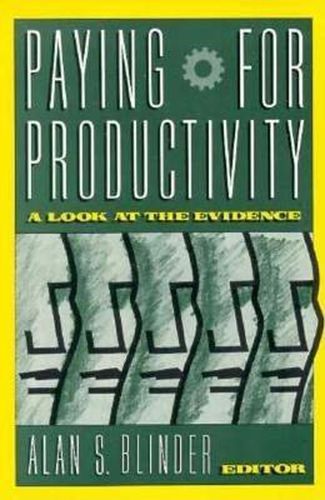Readings Newsletter
Become a Readings Member to make your shopping experience even easier.
Sign in or sign up for free!
You’re not far away from qualifying for FREE standard shipping within Australia
You’ve qualified for FREE standard shipping within Australia
The cart is loading…






Will higher pay provide an incentive for better work? Can productivity be increased by changing the way workers are compensated? In response to the urgent need to improve productivity performance in American industry, leading economists examine alternative compensation schemes to assess their efficiency in raising productivity.
Over the years a number of suggestions have been made for improving labor productivity by changing the manner in which laborers are compensated for their efforts. The ideas presented and analyzed in this volume have all been put into practice, in modified form or on a small scale, in the United States or elsewhere. Some are new; others quite old.
David I. Levine and Laura D'Andrea Tyson consider the effects of employee participation in decisionmaking on firm performance, and Martin L. Weitzman and Douglas L. Kruse discuss the implications of profit sharing and related forms of pay for group performance. Michael A. Conte and Jan Svejnar analyze employee stock ownership plans in the United States and other forms of worker ownership in Europe; Masanore Hashimoto uses a transaction-cost perspective to assess Japanese employment and wage systems. Daniel J. B. Mitchell, David Lewin, and Edward E. Lawler III give an overall analysis of traditional and alternative pay systems, their history, development, and curent use, and recommend further experimentation with alternative compensation plans to ensure more adaptability on the part of U.S. firms. Blinder provides an overview of the findings and conclusions.
$9.00 standard shipping within Australia
FREE standard shipping within Australia for orders over $100.00
Express & International shipping calculated at checkout
Will higher pay provide an incentive for better work? Can productivity be increased by changing the way workers are compensated? In response to the urgent need to improve productivity performance in American industry, leading economists examine alternative compensation schemes to assess their efficiency in raising productivity.
Over the years a number of suggestions have been made for improving labor productivity by changing the manner in which laborers are compensated for their efforts. The ideas presented and analyzed in this volume have all been put into practice, in modified form or on a small scale, in the United States or elsewhere. Some are new; others quite old.
David I. Levine and Laura D'Andrea Tyson consider the effects of employee participation in decisionmaking on firm performance, and Martin L. Weitzman and Douglas L. Kruse discuss the implications of profit sharing and related forms of pay for group performance. Michael A. Conte and Jan Svejnar analyze employee stock ownership plans in the United States and other forms of worker ownership in Europe; Masanore Hashimoto uses a transaction-cost perspective to assess Japanese employment and wage systems. Daniel J. B. Mitchell, David Lewin, and Edward E. Lawler III give an overall analysis of traditional and alternative pay systems, their history, development, and curent use, and recommend further experimentation with alternative compensation plans to ensure more adaptability on the part of U.S. firms. Blinder provides an overview of the findings and conclusions.